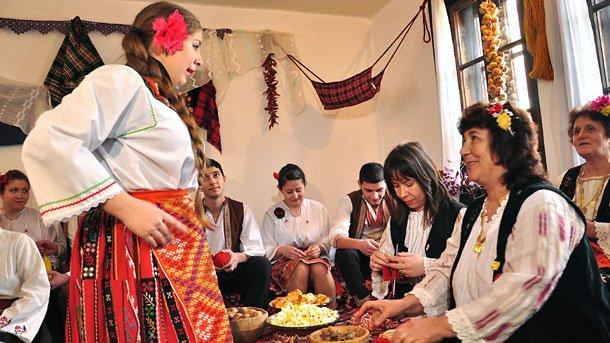“There’s no place like home,” “Going out is sweet, staying home – sweeter.” Proverbs such as these are to be found in any tradition. In Bulgarian folklore the home is more than the house that has given a roof to the family; it is above all the idea of a big family with lots of children who work together, eat together, share everything be it good or bad. The home is a sanctuary for many of the rituals in the traditional calendar. That is where people are born, where they marry and where they ultimately leave this world. That is why building a new house is such an important time for everyone. According to some studies the Bulgarian word for house “kushta” is derived from “kutam” or put aside, provide shelter.
The spot where the new house was to be built was chosen very carefully, with a keen sense of the presence of other invisible worlds, the worlds of good and evil. A meadow or a clearing was thought to be the best spot – the round shape was a natural barrier, and they were exposed to the sunlight and were overgrown with grass which meant the soil was good. According to traditional belief where wood-nymphs gather, grass does not grow. And also – if there is a big cornel-tree growing there, the place may be inhabited by dark forces. In some parts of the country spells are cast using rye grains. Rye was scattered around and if within a week the grains remained whole the construction could begin. But if the grains were scattered or eaten by animals then the place was no good. Another ritual that was a must was plowing done by twins – men and women. The male twins would plough in a circle around the designated spot; after them came the female twins who would throw wheat seeds. This was believed to ward off evil forces and the wheat that sprouted kept them away. They are the symbol of fertility, of life, of a yearning for light.

© Photo: BТА
Building a house was entirely a man’s job. Only a man who had built a house could be called a good keeper. After his death he would be revered as a patron spirit of the tangible and intangible wealth of the clan and of the coming generations. Deeply ingrained is the idea that the home is the magical centre of the world, structured vertically and horizontally, shaped as a replica of the world tree and the crucifix.
The moment when the ground was broken was the first step into an unknown and uncharted realm. Breaking the ground was the privilege of the future homeowner – it was an initiation ritual that led to his transformation, his rebirth. From a man without a home of his own he became a landlord. Another important element was the sacrifice – usually a red or a black rooster was slaughtered at the house’s foundations when the hearth or the threshold was built before the first time the home was entered.
When the house was completed a gift was made – a cross made out of fruit-tree twigs on which a bunch or a wreath of flowers was tied by a red thread. On the cross a man’s shirt was hung, right way up and the cross was fixed up on the roof, facing east. When the house was ready a dog would be let inside. Man’s best friend is believed to always choose the best spot to lie down. That is why the beds were placed wherever the dog had “pointed”.
A new house had to be entered when there was a new moon, on a good day and at a good hour. The good days were Monday and Wednesday; the good hour was before dawn – that was when God was still in the house. The fire was lit in the fireplace as the first rays of the sun entered the house. Signs of a new birth, magic spells for fertility and a successful beginning were also sought in the person who was the first to step over the threshold of the new home and it had to be the landlord. After him came his wife, a pregnant woman or young bride. As they entered each one would sprinkle their way with water, throw wheat and money onto the ground. The first person inside – usually the man of the house – would light the fire and his wife would ritually knead the bread in the trough. Baked in the new fireplace and shared out by all it would make for a close-knit family. This bread was the first sacrifice made inside the new house. And each member of the household would say “This home is God’s home”; saying “This home is mine” was thought to be a sin.
English version: Milena Daynova
For the fourth year in a row, the town of Tran in Western Bulgaria will host a winter festival of masquerade games. The beginning will be set on February 3 from 12:00 to 14:00 in the central town square. Four survakari groups from Zemen, Trun and the..
On February 2, according to the Bulgarian folk calendar, it is Petlyovden (Rooster Day) - a day dedicated to the health and fertility of male offspring. It is most widely popular in Eastern Bulgaria. One of the obligatory elements is the..
Wine will spout from two drinking fountains over the weekend in Delchevo. Perched on top of the mountain, the village located close to Gotse Delchev, has made a name for itself as a tourist attraction with its ancient architecture and the beautiful..

+359 2 9336 661
